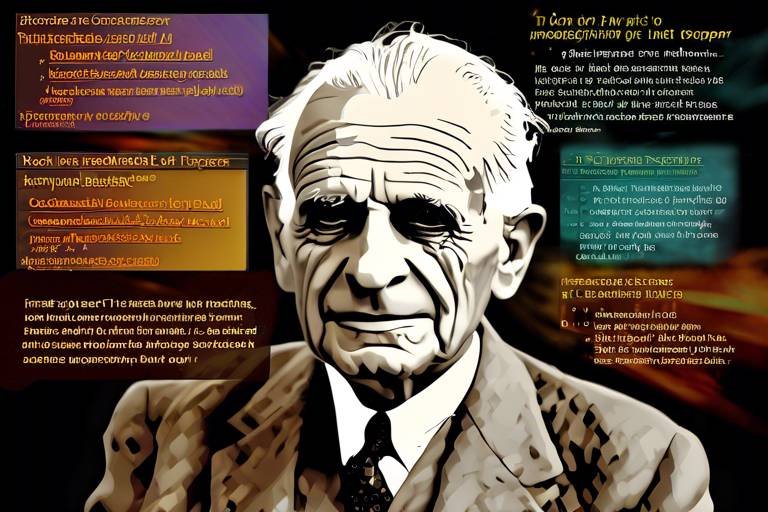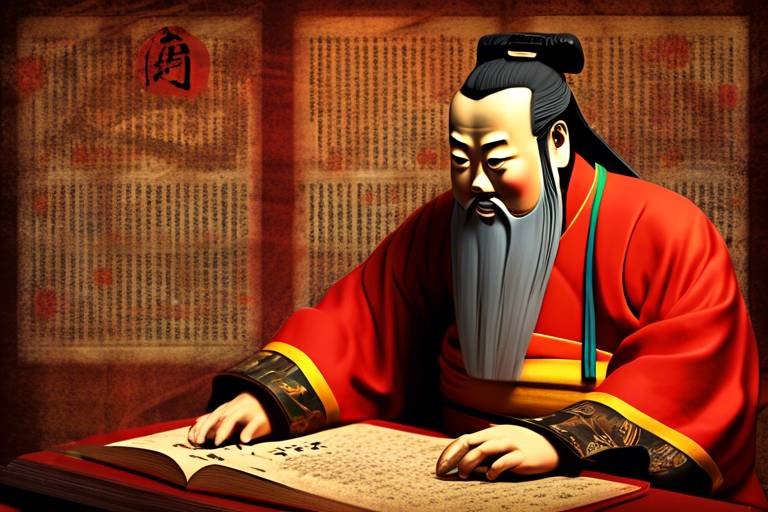Epicurus – Pleasure, Wisdom, and the Good Life
When we think about the good life, what comes to mind? Is it the pursuit of wealth, fame, or perhaps something deeper? Epicurus, the ancient Greek philosopher, had a different take. He believed that the essence of a fulfilling life lies in the pursuit of pleasure and the acquisition of wisdom. But before you jump to conclusions about hedonism, let's dive deeper into what Epicurus truly meant by pleasure and how his philosophy remains relevant today.
Epicurus founded a school of thought known as Epicureanism, which emphasized that pleasure is the highest good. However, it’s crucial to understand that Epicurus didn’t advocate for mindless indulgence. Instead, he encouraged a thoughtful approach to pleasure, one that prioritizes mental tranquility and long-term happiness over fleeting physical sensations. In a world that often equates happiness with material gain, Epicurus offers a refreshing perspective: true happiness comes from understanding our desires and choosing wisely.
At its core, Epicureanism teaches us that not all pleasures are created equal. There’s a distinction between kinetic pleasures, which are derived from activity and stimulation, and static pleasures, which come from the absence of pain and the experience of peace. This differentiation is essential for achieving a balanced life. Imagine kinetic pleasures as the excitement of a roller coaster ride—thrilling and exhilarating, but ultimately short-lived. In contrast, static pleasures are like a serene day spent in nature, where the calmness washes over you and lingers long after the moment has passed.
Epicurus believed that understanding these types of pleasure allows individuals to navigate life more effectively. By knowing what truly brings us joy, we can make better choices that lead to lasting fulfillment. This philosophy is not just a relic of the past; it resonates with us today as we strive to find meaning in our fast-paced lives. It prompts us to ask ourselves: What do we genuinely value? What brings us true peace and happiness?
In the modern context, Epicureanism encourages us to cultivate a life rich in experiences that promote well-being. It’s about savoring the little moments, whether that’s enjoying a good book, spending time with loved ones, or simply taking a moment to breathe deeply and appreciate the world around us. By focusing on these aspects, we can create a life that feels rich and fulfilling, rather than merely busy.
- What is Epicureanism? Epicureanism is a philosophy founded by Epicurus that emphasizes the pursuit of pleasure and the importance of wisdom in achieving a fulfilling life.
- How does Epicurus define pleasure? Epicurus defines pleasure as not just physical indulgence but a state of tranquility and the absence of pain.
- What are kinetic and static pleasures? Kinetic pleasures are derived from activity and stimulation, while static pleasures are associated with tranquility and the absence of pain.
- Why is friendship important in Epicureanism? Friendship is considered one of the greatest pleasures, enhancing well-being and providing support throughout life’s challenges.

The Philosophy of Epicureanism
Epicureanism is often misunderstood as a mere pursuit of indulgence, yet at its core, it is a profound philosophy that champions the pursuit of pleasure as the highest good. Unlike hedonism, which can sometimes imply reckless abandon in the quest for pleasure, Epicurus advocated for a more measured approach. He believed that true pleasure is achieved not through excess, but through the cultivation of a tranquil mind and a balanced life. This philosophy encourages individuals to seek out pleasures that lead to lasting happiness, rather than fleeting moments of gratification.
At the heart of Epicureanism lies the idea that pleasure should be pursued wisely. Epicurus taught his followers to differentiate between various types of pleasures and to prioritize those that contribute to a peaceful and fulfilling life. This is where the distinction between kinetic and static pleasures becomes essential. Kinetic pleasures stem from activities that stimulate our senses, while static pleasures are found in the absence of pain and the experience of inner peace. Understanding these categories allows individuals to make informed choices about their pursuits, leading to a more satisfying existence.
Moreover, Epicurus emphasized the importance of moderation and self-reflection in the pursuit of happiness. He believed that by cultivating wisdom and understanding our desires, we can better navigate the complexities of life. This approach not only enhances our enjoyment of pleasures but also helps us avoid unnecessary suffering. Epicurus famously stated, "It is not what we have, but what we enjoy, that constitutes our abundance." This perspective shifts the focus from material wealth to the richness of experiences and relationships, inviting us to reflect on what truly matters in life.
In essence, Epicureanism is a call to live thoughtfully and intentionally. It encourages us to embrace the present moment, to savor the simple joys, and to build connections that enrich our lives. By doing so, we can cultivate a life filled with meaningful pleasures and profound wisdom. This philosophy remains relevant today, reminding us that the pursuit of happiness is not just about seeking pleasure but about understanding ourselves and the world around us.

The Role of Pleasure in Life
Pleasure, according to Epicurus, is not merely about indulging in the fleeting joys of life, but rather, it encompasses a deeper state of tranquility and contentment. Imagine pleasure as a vast ocean; while the waves may represent the momentary thrills we chase, the calm beneath the surface symbolizes the enduring peace that comes from understanding and appreciating life’s simpler joys. Epicurus believed that true happiness arises from a balance of pleasures that nurture our minds and bodies, leading us toward a fulfilling existence.
In Epicurean philosophy, pleasure can be categorized in various ways, but the most significant distinction lies between physical and mental pleasures. Physical pleasures often evoke the idea of indulgence—think of the rich taste of your favorite dessert or the thrill of an exhilarating adventure. However, Epicurus argued that these pleasures should be enjoyed in moderation, as excess can lead to pain and discomfort. On the other hand, mental pleasures are rooted in the appreciation of knowledge, friendship, and a serene mind. These pleasures are not just fleeting; they have the power to sustain us through life’s challenges.
To better understand the role of pleasure in our lives, let’s explore the two primary types of pleasure that Epicurus emphasized:
- Kinetic Pleasures: These are the pleasures derived from active engagement in life. They include physical activities, social interactions, and experiences that stimulate our senses. While they can provide immediate satisfaction, they often come with a catch: they are temporary and can lead to a longing for more.
- Static Pleasures: In contrast, static pleasures are associated with the absence of pain and the experience of tranquility. This includes moments of peace, contentment, and the joy of simply being. Epicurus advocated for cultivating these static pleasures, as they contribute to a lasting sense of happiness and fulfillment.
Consider this: when was the last time you found joy in a quiet moment, perhaps sipping tea while watching the sunset? These static pleasures are often overlooked in our fast-paced lives, yet they are essential for achieving true happiness. Epicurus taught that by prioritizing these moments of tranquility, we can build a more resilient foundation for our overall well-being.
Ultimately, the role of pleasure in life is to guide us toward a state of happiness that transcends mere enjoyment. It encourages us to seek a harmonious balance between kinetic and static pleasures, allowing us to lead a life that is rich in experiences yet grounded in peace. By following Epicurus’s teachings, we can learn to appreciate the beauty of both the exhilarating and the serene, crafting a life that is not only pleasurable but also profoundly meaningful.
What is the main idea of Epicureanism?
Epicureanism revolves around the pursuit of pleasure as the highest good, emphasizing a balanced approach to both physical and mental pleasures.
How does Epicurus define pleasure?
Epicurus defines pleasure not just as physical indulgence but as a state of tranquility and contentment, highlighting the importance of both kinetic and static pleasures.
Why are static pleasures important?
Static pleasures, such as tranquility and peace, are crucial for lasting happiness, as they provide a stable foundation for our well-being amidst life’s challenges.
How can one cultivate static pleasures in daily life?
One can cultivate static pleasures by prioritizing moments of stillness, mindfulness, and appreciation for simple joys, such as nature, friendships, and quiet reflection.

Types of Pleasure
When we dive into the world of Epicurean philosophy, we quickly uncover a fascinating distinction between two types of pleasure: kinetic and static. These categories not only help us understand the nature of pleasure but also guide us in our quest for a fulfilling life. Imagine kinetic pleasures as the vibrant, exhilarating moments that make your heart race—like a thrilling roller coaster ride or a night out with friends. They are all about action, stimulation, and the rush of experiences. On the flip side, we have static pleasures, which are more about peace, tranquility, and the absence of discomfort. Think of these as the cozy moments spent curled up with a good book or enjoying a serene sunset. Both types of pleasure are essential, yet they serve different purposes in our lives.
Kinetic pleasures can be incredibly enticing, drawing us into a whirlwind of excitement and activity. They often come from engaging in hobbies, sports, or social gatherings that ignite our passions. For instance, participating in a lively dance party or embarking on an adventurous hike can fill us with joy and exhilaration. However, while these experiences can be immensely satisfying, they tend to be fleeting. The thrill of the moment can quickly fade, leaving us craving the next rush. This is where static pleasures come into play, offering a counterbalance to the highs of kinetic experiences.
Static pleasures, on the other hand, cultivate a sense of lasting happiness. They are rooted in the idea of finding contentment in simplicity and tranquility. When we experience static pleasures, we often feel a deep sense of satisfaction that transcends the immediate excitement of kinetic pleasures. Examples include savoring a delicious meal, enjoying a peaceful moment in nature, or simply sharing a quiet conversation with a friend. These moments allow us to recharge, reflect, and reconnect with ourselves and others.
To illustrate the differences between kinetic and static pleasures, consider the following table:
| Type of Pleasure | Description | Examples |
|---|---|---|
| Kinetic | Active pleasures that provide stimulation and excitement. | Concerts, sports, travel, parties |
| Static | Passive pleasures that foster tranquility and contentment. | Reading, meditation, nature walks, quiet evenings |
In the grand tapestry of life, both kinetic and static pleasures play crucial roles. They complement each other, creating a balanced approach to happiness. By understanding and embracing both types, we can lead a more fulfilling life, one that appreciates the thrill of the moment while also cherishing the peace that comes from within. So, the next time you find yourself chasing after the next big thrill, remember to pause and savor the simple joys that life has to offer. After all, true happiness often lies in the delicate balance between excitement and tranquility.

Kinetic Pleasures
Kinetic pleasures, as described by Epicurus, are those exhilarating experiences that arise from action and engagement. Think of them as the fireworks of life—bright, vibrant, and momentarily captivating. These pleasures are often tied to physical activities, social interactions, and various forms of stimulation that ignite our senses and propel us into a state of joy. However, it's crucial to understand that while these pleasures can provide immediate gratification, they are often fleeting, much like a roller coaster ride that leaves you breathless but craving more once it's over.
Examples of kinetic pleasures are abundant in our daily lives. They can range from the thrill of a new adventure, such as hiking a mountain or traveling to a foreign country, to the simple joy of dancing with friends at a party. Each of these experiences brings a rush of excitement, a surge of energy that reminds us we are alive. However, just as a firework show eventually fades into darkness, so too can these pleasures leave us yearning for the next high. It's essential to strike a balance between seeking out these kinetic experiences and recognizing their temporary nature.
In the pursuit of kinetic pleasures, one must also consider the impact of moderation. Engaging in too many stimulating activities can lead to exhaustion and burnout, much like overindulging in candy can result in a stomach ache. Epicurus advocated for a measured approach, suggesting that we should embrace kinetic pleasures while also being mindful of their limitations. This balance allows us to enjoy the thrill of life without becoming overwhelmed by it.
To illustrate the relationship between kinetic pleasures and a fulfilling life, let's take a look at the following table, which categorizes various kinetic pleasures and their potential impacts:
| Kinetic Pleasure | Examples | Potential Impact |
|---|---|---|
| Physical Activities | Running, dancing, sports | Boosts mood, enhances fitness |
| Social Interactions | Parties, gatherings, conversations | Strengthens bonds, increases joy |
| New Experiences | Traveling, exploring, trying new hobbies | Expands perspective, fosters growth |
Ultimately, kinetic pleasures are an essential component of the Epicurean philosophy. They remind us to embrace life with open arms, to seek out experiences that fill our hearts with joy, and to savor the moments that make us feel truly alive. However, as with all things, the key lies in balance. By recognizing the transient nature of kinetic pleasures, we can appreciate them more deeply and allow them to enrich our lives without overshadowing the quieter, more stable joys that come from static pleasures.

Static Pleasures
Static pleasures, as defined by Epicurus, embody a deeper sense of fulfillment that transcends mere physical gratification. These pleasures arise from the absence of pain and the experience of tranquility, allowing individuals to savor the quiet moments of life. Imagine sitting in a serene garden, the gentle rustle of leaves in the breeze, and the warm sun kissing your skin—this is the essence of static pleasure. It’s not about the thrill of a rollercoaster ride or the excitement of a night out; instead, it’s about finding joy in stillness and contentment.
Epicurus believed that these static pleasures are vital for achieving lasting happiness. They provide a refuge from the chaos of everyday life and allow us to reflect on our experiences. In a world that often glorifies busyness and constant stimulation, recognizing the value of tranquility can be a game changer. This kind of pleasure encourages us to slow down, appreciate the moment, and cultivate a sense of gratitude for what we have.
To illustrate the significance of static pleasures, let’s consider some examples:
- Nature: Spending time in nature, whether it's a peaceful hike through the woods or a quiet evening by the sea, allows us to reconnect with ourselves and find inner peace.
- Mindfulness: Engaging in mindfulness practices, such as meditation or yoga, helps to quiet the mind and promotes a state of calm.
- Quality Time: Enjoying a cozy evening at home with loved ones, free from distractions, can foster deep connections and a sense of belonging.
In essence, static pleasures are about embracing the present and finding joy in simplicity. They remind us that happiness doesn’t always come from grand experiences or material possessions; often, it’s the small, quiet moments that hold the most significance. By prioritizing these static pleasures in our lives, we can cultivate a sense of well-being that is both profound and enduring.
In conclusion, while kinetic pleasures may bring excitement and temporary satisfaction, it is the static pleasures that lay the foundation for a truly fulfilling life. By nurturing these moments of tranquility, we can achieve a deeper understanding of ourselves and what it means to live well. So, the next time you find yourself rushing through life, take a moment to pause, breathe, and appreciate the static pleasures that surround you.
What are static pleasures according to Epicurus?
Static pleasures are those that arise from the absence of pain and the experience of tranquility, focusing on inner peace and contentment rather than active stimulation.
How can I incorporate static pleasures into my life?
You can incorporate static pleasures by engaging in mindfulness practices, spending time in nature, and nurturing deep connections with loved ones in a relaxed environment.
Why are static pleasures important for happiness?
Static pleasures provide a sense of calm and fulfillment that helps balance the excitement of kinetic pleasures, leading to a more profound and lasting happiness.

The Pursuit of Wisdom
Wisdom, in the realm of Epicurean philosophy, is not just a lofty concept reserved for philosophers or scholars; it's a practical tool that can transform our everyday lives. Epicurus believed that the pursuit of wisdom is essential for achieving a pleasurable existence. But what does it mean to pursue wisdom? It's about seeking knowledge and understanding that can guide our decisions, enrich our experiences, and ultimately lead us to a more fulfilling life.
Imagine wisdom as a compass in a dense forest. Without it, you might wander aimlessly, chasing fleeting pleasures that leave you feeling empty. However, with wisdom, you can navigate through life’s complexities, making choices that align with your true desires and values. Epicurus emphasized that the wise person seeks to understand the nature of pleasure and pain, recognizing that not all pleasures are beneficial and not all pains are harmful. This nuanced understanding is crucial for living a balanced life.
One of the key aspects of pursuing wisdom is the ability to differentiate between superficial pleasures and those that contribute to long-term happiness. For instance, indulging in a decadent dessert might provide a momentary thrill, but it could also lead to feelings of guilt or physical discomfort later. In contrast, engaging in a meaningful conversation with a friend might not offer immediate gratification but can foster deeper connections and lasting joy. Epicurus encouraged us to reflect on our experiences and learn from them, thereby cultivating a more profound sense of wisdom.
Furthermore, wisdom allows us to evaluate our desires critically. Epicurus taught that not all desires should be pursued. Some are natural and necessary, like the need for food and shelter, while others are unnecessary and can lead to distress. By understanding which desires are essential and which are superfluous, we can focus our energy on what truly matters, leading to a more satisfying life. This discernment is a hallmark of wisdom and a vital component of the Epicurean way of life.
In today's fast-paced world, where distractions abound and instant gratification is often the norm, the pursuit of wisdom becomes even more significant. It encourages us to slow down, reflect, and prioritize what genuinely contributes to our happiness. Epicurus believed that through the cultivation of wisdom, we not only enhance our own lives but also positively impact those around us. As we grow wiser, we become better friends, partners, and community members, creating a ripple effect of joy and fulfillment.
In conclusion, the pursuit of wisdom is a journey that enriches our lives and helps us navigate the complexities of existence. By embracing this philosophy, we can learn to appreciate the deeper pleasures of life, fostering a sense of tranquility and happiness that resonates through our relationships and communities. So, as you reflect on your own life, consider how you might cultivate wisdom in your daily experiences, and watch as your understanding of pleasure transforms.
- What is the main focus of Epicurean philosophy? Epicurean philosophy primarily focuses on the pursuit of pleasure as the highest good, emphasizing the importance of wisdom and friendship in achieving a fulfilling life.
- How does wisdom contribute to happiness? Wisdom helps individuals make informed decisions, discern between beneficial and harmful pleasures, and cultivate meaningful relationships, all of which contribute to a more satisfying life.
- What are kinetic and static pleasures? Kinetic pleasures are those derived from activity and stimulation, while static pleasures are associated with the absence of pain and the experience of tranquility.
- Why is friendship important in Epicureanism? Friendship is considered one of the greatest pleasures in Epicurean philosophy, providing support, joy, and a sense of belonging in life.

Friendship and Community
When we think about the essence of a fulfilling life, we often overlook the profound impact that friendship and community have on our overall happiness. Epicurus, the ancient Greek philosopher, placed a significant emphasis on the value of friendships, asserting that they are one of the greatest sources of pleasure. In a world where individualism often reigns supreme, it’s crucial to remember that our connections with others can dramatically enhance our well-being. Think about it: isn’t life a little brighter when we share it with others? The bonds we form can serve as a cushion against life’s inevitable challenges, providing us with emotional support and a sense of belonging.
Epicurus believed that true happiness is not found in the accumulation of material wealth or fleeting pleasures but rather in the richness of our relationships. He argued that the joy derived from deep connections is far superior to any temporary satisfaction gained from physical indulgence. This perspective invites us to reflect on our own lives: are we prioritizing our friendships and cultivating a supportive community? The answer may very well determine our level of contentment.
In the realm of Epicurean thought, friendship is not just a nice-to-have; it is a fundamental component of a good life. When we engage in meaningful relationships, we unlock a treasure trove of shared experiences and mutual support. Imagine having a circle of friends who not only celebrate your successes but also stand by you during tough times. This is the essence of true friendship—an unwavering support system that fosters resilience and joy. Furthermore, friendships can lead to communal experiences that amplify our pleasures, creating a ripple effect of happiness that extends beyond the individual.
Building a supportive community is equally important in the Epicurean framework. When we surround ourselves with like-minded individuals who share our values and goals, we create an environment ripe for collective happiness. This community acts as a nurturing ground where ideas flourish, and wisdom is shared. Whether it’s through engaging in discussions, participating in group activities, or simply enjoying each other’s company, the bonds we form within our communities can significantly enhance our quality of life.
To illustrate the impact of friendship and community on our happiness, consider the following table that outlines some of the key benefits:
| Benefits of Friendship and Community | Description |
|---|---|
| Emotional Support | Friends provide a safety net during challenging times, helping us navigate life's ups and downs. |
| Shared Joys | Celebrating milestones with friends amplifies our happiness and creates lasting memories. |
| Sense of Belonging | A supportive community fosters a feeling of acceptance and inclusion, reducing feelings of loneliness. |
| Growth and Learning | Engaging with others encourages personal development and the exchange of ideas. |
In conclusion, the teachings of Epicurus remind us that friendship and community are not just peripheral aspects of a fulfilling life; they are central to our happiness. By investing time and energy into nurturing our relationships and building supportive communities, we can create a life that is rich in pleasure, wisdom, and meaning. So, the next time you find a moment to connect with a friend or engage with your community, remember that you are not just enhancing your own life but also contributing to a larger tapestry of shared joy and fulfillment.
1. Why is friendship important according to Epicurus?
Epicurus believed that friendship is one of the greatest sources of pleasure and happiness, providing emotional support and a sense of belonging.
2. How can I cultivate deeper friendships?
Invest time in meaningful conversations, share experiences, and be present for your friends during both good times and bad.
3. What role does community play in happiness?
A supportive community fosters shared experiences, encourages personal growth, and amplifies joy through collective engagement.

The Value of Friendship
Friendship, according to Epicurus, is not just a social connection; it is a vital source of happiness and a key component of a fulfilling life. Imagine a world where you have no one to share your joys, sorrows, or even your mundane daily activities with. It would feel rather empty, wouldn’t it? Epicurus understood that true pleasure is amplified when shared with others. This is why he placed such a high value on friendships, seeing them as one of the greatest pleasures one can experience.
Deep connections with friends provide a support system that can help us navigate the ups and downs of life. Think of friendship as a safety net: when life throws you a curveball, it’s those close relationships that catch you. Friends offer not only emotional support but also practical assistance, whether it’s lending a helping hand during tough times or simply being there to celebrate your achievements. In fact, research has shown that strong friendships can lead to increased happiness and even better health outcomes.
Epicurus believed that the essence of friendship lies in its ability to foster a sense of belonging and community. When we engage with our friends, we create shared memories and experiences that enrich our lives. Consider the moments spent laughing over a meal, discussing dreams, or even just sitting in comfortable silence. These interactions are not just moments; they are building blocks of our happiness.
Moreover, friendships encourage us to grow and evolve. When we surround ourselves with positive influences, we are more likely to adopt similar values and behaviors. This mutual growth is essential for a fulfilling life. As we share our thoughts and ideas, we challenge each other and learn from one another, creating a dynamic that enhances our understanding of the world.
In Epicurean philosophy, it is essential to cultivate friendships that are genuine and supportive. This means investing time and energy into relationships that bring joy and positivity into our lives. It’s about surrounding ourselves with people who uplift us rather than drain our energy. In this way, friendship becomes a conscious choice, a deliberate action that contributes to our overall well-being.
To emphasize the importance of friendship, here are some key benefits:
- Emotional Support: Friends provide comfort during difficult times, helping to alleviate feelings of loneliness and distress.
- Shared Joy: Celebrating achievements and milestones with friends enhances the joy of those experiences.
- Personal Growth: Friends challenge us to be our best selves, encouraging personal development and self-discovery.
- Health Benefits: Strong social connections are linked to lower stress levels and better physical health.
In conclusion, the value of friendship in Epicurean thought cannot be overstated. It is a crucial element in the pursuit of happiness and a fulfilling life. By nurturing our friendships, we not only enhance our own lives but also contribute to the happiness of those around us. So, let’s take a moment to appreciate the friends in our lives and recognize the profound impact they have on our journey towards the good life.
1. Why is friendship important in Epicurean philosophy?
Friendship is seen as a source of happiness and fulfillment, providing emotional support, shared experiences, and opportunities for personal growth.
2. How can I cultivate meaningful friendships?
Invest time in relationships that uplift you, engage in shared activities, and communicate openly to strengthen your connections.
3. What are the health benefits of having strong friendships?
Strong friendships can lead to lower stress levels, improved mental health, and even better physical health outcomes.
4. How do friendships contribute to personal growth?
Friends challenge us to think differently, support our goals, and provide feedback that encourages self-discovery and development.

Building a Supportive Community
When it comes to living a fulfilling life, the importance of a supportive community cannot be overstated. Imagine trying to climb a mountain all by yourself—it's daunting, isn't it? Now, picture having a group of friends by your side, cheering you on, sharing the load, and celebrating each milestone with you. That’s the essence of community in the context of Epicurean philosophy. Epicurus believed that our connections with others significantly enhance our happiness and well-being. In fact, he argued that friendship is one of the greatest pleasures in life, providing emotional support and a sense of belonging that is essential for a fulfilling existence.
Building a supportive community is not just about gathering people together; it's about fostering genuine relationships where individuals can share their joys and challenges. The bonds we create with others can lead to a collective happiness that amplifies our personal experiences. Here are some key aspects to consider when nurturing a supportive community:
- Open Communication: Encouraging honest and open dialogue allows members to express their thoughts and feelings freely. This transparency builds trust, which is the foundation of any strong relationship.
- Shared Experiences: Engaging in activities together—be it through hobbies, volunteer work, or simply sharing meals—helps strengthen the ties that bind us. These shared moments create lasting memories and deepen connections.
- Mutual Support: A community thrives when its members support one another through life’s ups and downs. Whether it's offering a listening ear or lending a helping hand, being there for each other fosters a sense of security and belonging.
Moreover, a supportive community can serve as a refuge during difficult times. When faced with challenges, knowing that you have friends and family to lean on can make all the difference. This emotional safety net not only alleviates stress but also encourages personal growth. Just like a tree that stands tall and strong because of the roots that hold it firm, we too can flourish when supported by a robust community.
In addition to emotional support, communities can also provide opportunities for collective learning and wisdom-sharing. Imagine a gathering where individuals from diverse backgrounds come together to share their experiences and insights. This exchange of knowledge enriches everyone involved, creating a culture of continuous growth and understanding. Epicurus valued wisdom highly, and in a community where learning is encouraged, individuals can inspire each other to pursue their passions and lead more fulfilling lives.
Ultimately, building a supportive community is about creating an environment where everyone feels valued and heard. It's about cultivating relationships that not only bring joy but also foster a sense of purpose and belonging. So, take the time to invest in your community—whether it’s through volunteering, hosting gatherings, or simply reaching out to friends. The effort you put into nurturing these connections will pay off in countless ways, leading to a richer, more fulfilling life.
1. How can I start building a supportive community?
To begin, reach out to friends, family, or neighbors and express your desire to connect. Organize small gatherings or participate in local events to meet new people. Remember, building relationships takes time, so be patient and open.
2. What are some activities that can strengthen community bonds?
Engaging in group activities such as book clubs, sports, or volunteer work can help strengthen bonds. Shared experiences create lasting memories and deepen connections among community members.
3. How does a supportive community contribute to personal happiness?
A supportive community provides emotional support, fosters a sense of belonging, and encourages personal growth. When individuals feel connected to others, they are more likely to experience happiness and fulfillment in their lives.
Frequently Asked Questions
- What is Epicureanism?
Epicureanism is a philosophical system founded by Epicurus that emphasizes the pursuit of pleasure as the highest good. Unlike hedonism, which often focuses on physical indulgence, Epicureanism advocates for a more nuanced understanding of pleasure, including mental tranquility and the absence of pain.
- How does Epicurus define pleasure?
Epicurus defines pleasure not just as physical enjoyment but as a state of tranquility. He distinguishes between kinetic pleasures, which arise from activity, and static pleasures, which come from the absence of pain and the experience of peace. Both types are essential for achieving a balanced and fulfilling life.
- What are kinetic and static pleasures?
Kinetic pleasures are those that come from engaging in activities that stimulate the senses, such as eating, traveling, or socializing. In contrast, static pleasures are found in moments of peace and contentment, such as enjoying a quiet evening or reflecting on life. Both play important roles in achieving happiness according to Epicurus.
- Why is wisdom important in Epicurean philosophy?
Wisdom is crucial in Epicureanism because it helps individuals make informed choices that lead to a pleasurable and meaningful life. Knowledge and understanding guide us in navigating life's challenges, allowing us to pursue true happiness rather than fleeting pleasures.
- What role does friendship play in Epicurean thought?
Friendship is considered one of the greatest pleasures in Epicurean philosophy. Epicurus believed that deep connections with others enhance our well-being, providing support and joy throughout life's ups and downs. Strong friendships contribute significantly to a fulfilling and happy life.
- How can I build a supportive community?
Building a supportive community involves fostering relationships based on trust, respect, and shared values. Engage with others through social activities, discussions, and collaborative efforts. A strong community can provide a sense of belonging and collective happiness, enhancing the overall experience of life.



















